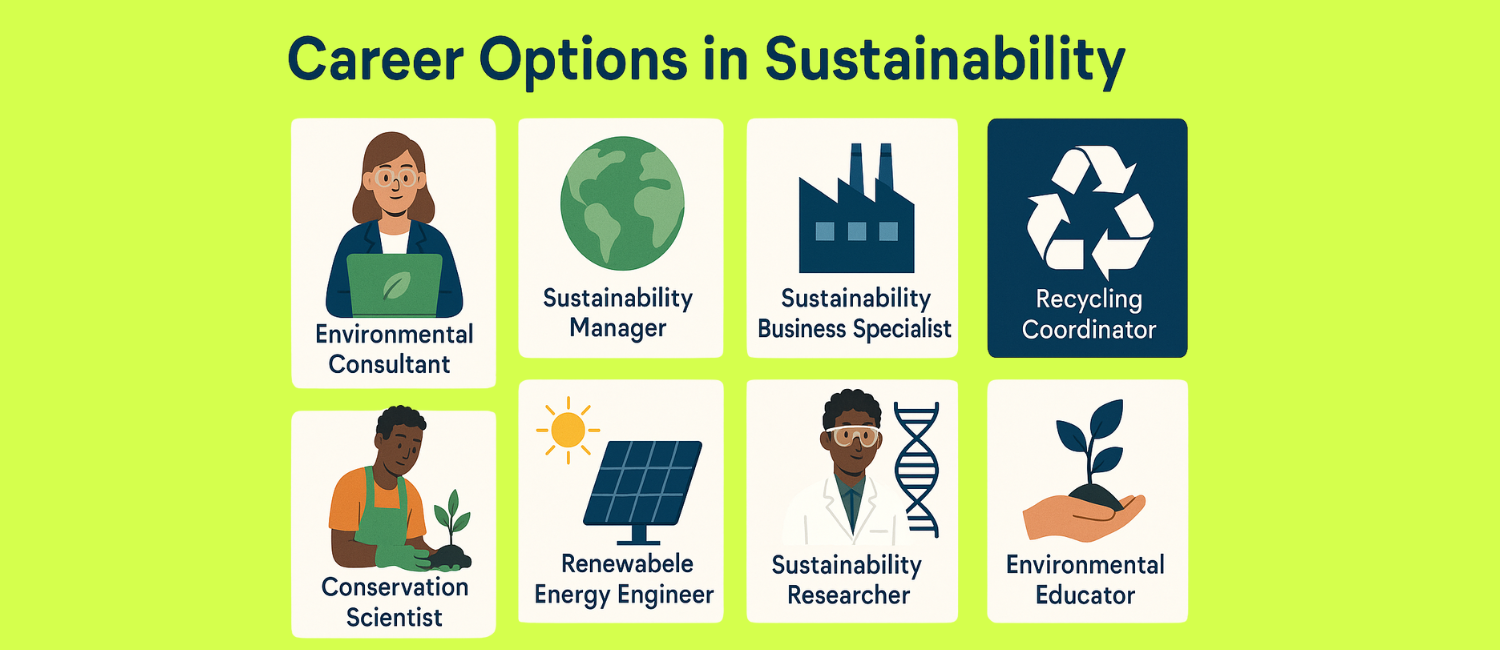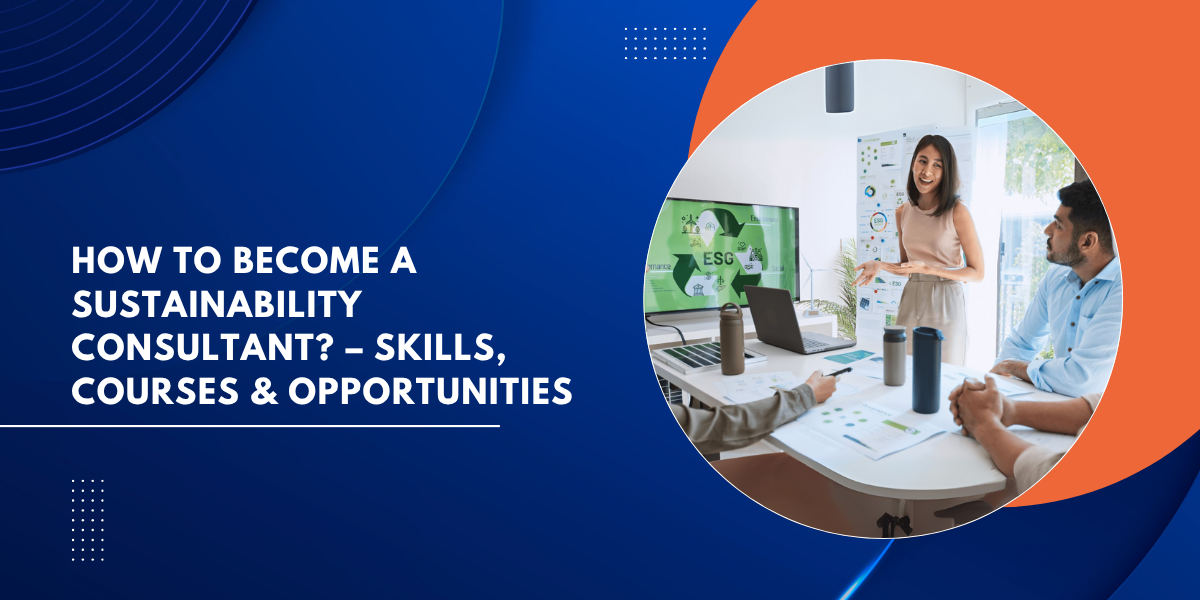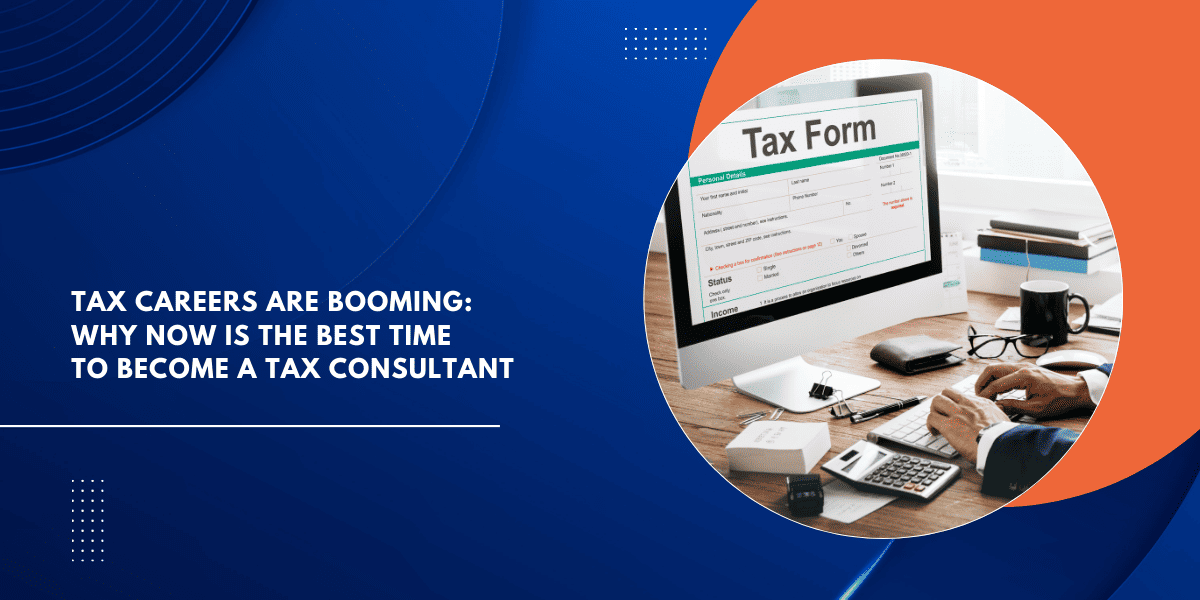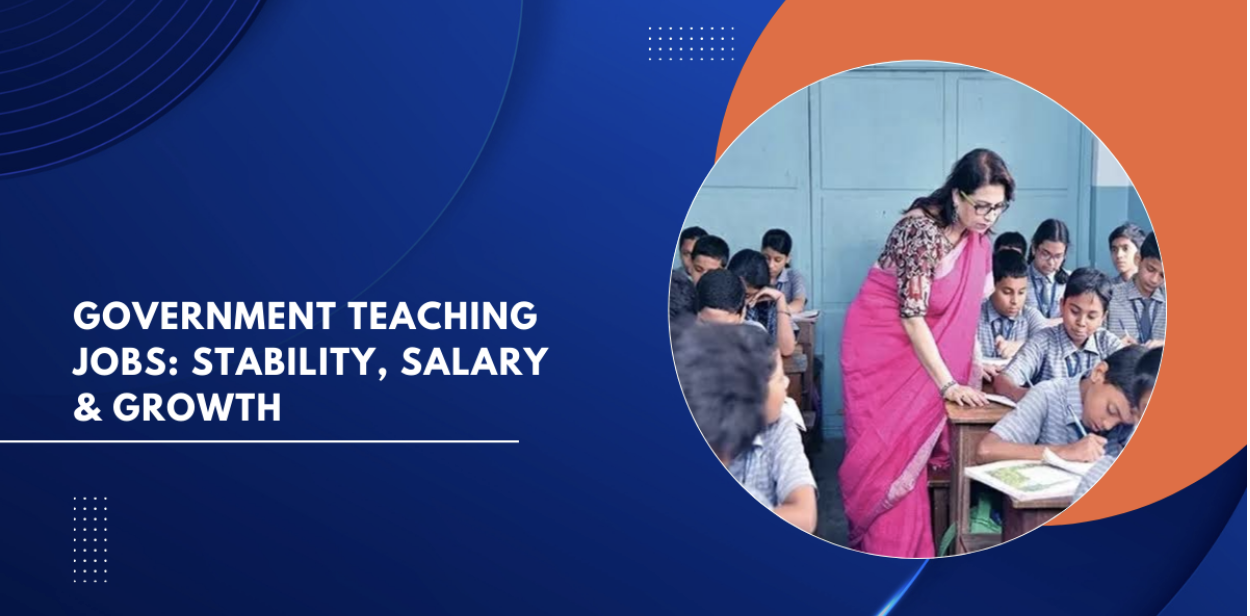By Preethi Durga, Career Strategist & Mentor
When Aarav finished Class 12 with a science background, he knew one thing for sure — he wanted a career that made a real difference. Not just a stable job, but something that helped the planet. That’s when he first came across the term Sustainability Consultant — and it immediately caught his attention.
He’d heard of engineers, architects, environmental scientists — but what exactly does a Sustainability Consultant do? And how do you become one?
In my experience, this is a common roadblock for many students who care deeply about climate change, clean energy, or ethical business practices. They want to help — but they’re unsure how that passion translates into a practical, well-paying career.
Here’s the good news: sustainability is no longer just a cause — it’s a career. And it’s growing fast across industries like tech, finance, energy, real estate, and even fashion.
In this blog, I’ll walk you through everything you need to know — from the skills required and the courses that help, to the job roles and industries that are actively hiring Sustainability Consultants.
Let’s get into it.

Introduction to the Career
If you ask me, one of the most overlooked yet powerful careers right now is sustainability consulting.
It’s not just about planting trees or talking about climate change. Sustainability consultants help businesses make smarter, cleaner, and more future-ready choices—across energy, water, waste, sourcing, and even how they design their buildings or manufacture products.
In my experience, companies today are under real pressure to be environmentally responsible—not just for branding, but because regulations, investors, and customers demand it. That’s where sustainability consultants come in. They offer data-backed advice to reduce emissions, save energy, and cut waste—all while improving business performance.
In India, this space is growing faster than most people realise. With ESG (Environmental, Social, Governance) reporting becoming mandatory for many companies, and green building norms tightening, there’s huge demand for trained professionals who understand both science and strategy. Whether it’s a tech park going solar, a food company reducing plastic, or a hotel chain cutting water use—there’s work everywhere.
So if you’re a student (or a parent helping one decide), and you’re looking for a meaningful, science-based career after Class 12 that’s not just about degrees but about real-world impact—sustainability consulting is absolutely worth exploring.
Emerging Trends Shaping the Future of Sustainability Consultants
From climate reporting mandates to green supply chains and AI-driven analytics, the role of a sustainability consultant is evolving faster than ever. No longer limited to audits and checklists, today’s consultants are expected to bridge strategy with innovation.
With global regulations tightening and consumers demanding transparency, companies across sectors are turning to sustainability experts for guidance on everything from net-zero transitions to circular design.
The future is green—not just by choice, but by necessity. With rising climate concerns, stricter environmental laws, and global sustainability goals like Net Zero, the demand for professionals in this field is growing fast.
According to a report by the International Labour Organization (ILO), the global shift to a greener economy could create over 24 million new jobs by 2030. Many of these will be in renewable energy, sustainable construction, waste management, and environmental consulting. And India, with its booming infrastructure and rapid urbanization, is right in the middle of this transition.
Sustainability consultants today aren’t just working with factories or power plants. They’re helping tech companies reduce energy use in data centers, advising architects on green buildings, guiding fashion brands on ethical sourcing, and working with governments on climate action plans.
If you’re thinking about this career, trust me—this isn’t a side gig or temporary trend. It’s a long-term, purpose-driven career that blends science, strategy, and systems thinking.
Key Responsibilities
A lot of students I meet are curious about sustainability—but aren’t exactly sure what a consultant does on a daily basis. Let’s break it down. Understanding the different roles can help you figure out what direction you want to take, and what kind of projects you’d enjoy working on.
Sustainability consulting is a wide field. Depending on your specialization and the kind of clients you work with, your role could look quite different. Here are some common focus areas:
Environmental Impact Analyst
- Evaluates how a business or project affects the environment
- Measures carbon footprint, waste levels, water usage, and more
- Recommends steps to reduce environmental harm
Energy Efficiency Consultant
- Audits buildings, factories, or campuses to track energy consumption
- Suggests changes in lighting, HVAC systems, or machinery to save power
- Helps shift to solar, wind, or other clean energy solutions
Sustainable Supply Chain Advisor
- Works with brands to make sourcing, packaging, and logistics more eco-friendly
- Reduces emissions and waste in the production process
- Promotes ethical practices, like fair wages and cruelty-free testing
Green Building Specialist
- Collaborates with architects and engineers to design eco-friendly buildings
- Ensures compliance with LEED or GRIHA certifications
- Optimizes materials, ventilation, and energy systems for sustainability
Sustainability Reporting Executive
- Helps companies track and share their environmental goals and progress
- Prepares ESG reports for stakeholders and regulatory bodies
- Works closely with CSR teams and financial auditors
So if you’re exploring this career, ask yourself: Do you enjoy research and problem-solving? Are you drawn to systems thinking or big-picture strategy? Do you want to work with people, data, or design? Your answers will help narrow down which sustainability path might fit you best.
Work Environment
From what I’ve seen, sustainability consultants thrive in roles where strategy meets real-world action. You might not be wearing a lab coat or working in a hospital, but your decisions affect everything—from how much energy a company uses to how waste is managed in a city.
Here are some of the common workplaces for sustainability consultants:
- Environmental and energy consulting firms
- Corporate sustainability departments
- Government and urban planning bodies
- NGOs and international development agencies
- Architecture and construction firms (especially green building projects)
The day-to-day work varies depending on your focus. One consultant might be on-site doing a waste audit in a factory, while another is behind a desk analysing energy usage data for a green certification report. Some spend their time leading workshops, while others develop sustainability roadmaps for entire organisations.
As a sustainability consultant, you are expected to:
- Analyse environmental impact using scientific and business tools
- Stay updated with environmental laws, green certifications, and ESG guidelines
- Communicate complex ideas clearly to clients, from CEOs to project teams
- Collaborate with different departments like design, operations, and finance
- Find practical, cost-effective solutions that balance people, planet, and profit

Whether you’re working in the field or behind a laptop, this role is all about purpose. It’s perfect for someone who enjoys meaningful problem-solving, cross-functional teamwork, and being part of long-term change.
Educational Path and Entrance Exams for a Career in Sustainability Consulting
If you’re planning to build a career in sustainability after Class 12, here’s some good news—there’s more than one way to get there. Whether you’re someone who wants a solid science foundation or someone who loves planning, policy, or business, there’s a path that fits your strengths and interests.
Here’s a structured look at popular courses and how to get into them:
Excel table
| Level | Course Name | Duration | Entrance Exams | Eligibility | Popular Universities/Institutes |
| UG | B.Sc. Environmental Science / Sustainability | 3 years | CUET / Institute-specific | 10+2 with PCB / PCM | Fergusson College, Shiv Nadar University, TERI SAS |
| UG | B.Tech Environmental Engineering | 4 years | JEE Mains / State CETs | 10+2 with PCM | DTU, NITs, Manipal Institute, VIT |
| UG | B.Plan / B.Arch (Sustainability electives) | 4–5 years | NATA / JEE | 10+2 with PCM | SPA Delhi, CEPT University, IIT Roorkee |
| UG | B.A. in Environmental Policy or Geography | 3 years | CUET / Institute-specific | 10+2 in any stream | Ashoka University, Symbiosis, Delhi University |
| PG | M.Sc. Environmental Science / Climate Studies | 2 years | Institute-specific | B.Sc. in relevant stream | TERI SAS, JNU, BHU, Amity |
| PG | M.Tech Environmental Engineering / Energy Systems | 2 years | GATE / Institute-specific | B.Tech in relevant stream | IIT Bombay, Anna University, NIT Trichy |
| PG | MBA in Sustainability Management / ESG | 2 years | CAT / XAT / Institute-specific | Bachelor’s degree in any field | IIM Lucknow (IPMX), TERI SAS, ISBF |
| PG | Masters in Urban Planning / Development Practice | 2 years | TISS-NET / CEPT / JNU entrance | Bachelor’s in any stream | TISS Mumbai, CEPT University, NIUA |
| Certificate | Online courses in ESG, Circular Economy, Carbon Auditing | 6–12 months | Direct admission | Open to all (some need UG degree) | Coursera, edX, Indian Institute of Sustainability, UNDP-TERI |
Depending on what you enjoy—science, engineering, urban development, or even policy—you can tailor your path. In my experience, the most effective sustainability consultants are those who blend technical knowledge with communication skills and real-world problem-solving.
Necessary Soft Skills & Technical Abilities
If you’re considering a career in sustainability, keep this in mind—it’s not just about loving the environment or knowing a few climate facts. From what I’ve seen, the best sustainability consultants bring a unique mix of science, systems thinking, and people skills to the table.
Some students enter this field expecting it to be purely research-based. But in reality, a big part of the job is about influence—helping businesses or institutions change long-held practices. That means you need to be both technically strong and socially aware.
Soft Skills:
✅ Critical Thinking: You’ll be solving complex problems that don’t always have obvious answers.
✅ Communication: You might be presenting green solutions to people who don’t understand the science—your clarity matters.
✅ Collaboration: You’ll work with engineers, designers, government officials, or CEOs. Listening and teamwork are vital.
✅ Ethical Awareness: Many decisions in sustainability involve values—what’s “best” for people, the planet, and the future.
✅ Curiosity: The field is evolving fast. Staying updated and asking the right questions keeps you ahead.
Technical Skills:
🛠️ Data Analysis: From carbon audits to water usage reports, you’ll need to handle environmental data and draw insights.
🛠️ Policy & Regulation Literacy: Knowing national and global standards like ESG, SDGs, and climate policy is crucial.
🛠️ Sustainability Tools & Frameworks: LCA (Life Cycle Assessment), carbon footprint calculators, green certification checklists.
🛠️ Reporting & Documentation: Writing clear sustainability reports, ESG disclosures, or client proposals.
🛠️ Project Management: Planning and tracking sustainability goals, timelines, and stakeholder inputs.
In short, if you’re someone who wants to create change—not just talk about it—sustainability consulting offers a powerful mix of purpose and professionalism. But just like in healthcare, soft skills can set you apart. They’re what help your advice turn into real-world action.
Career Progression and Growth Opportunities
One of the things I really like about sustainability consulting is how dynamic and layered the growth can be. Whether you begin with a science degree, an architecture background, or even a policy course, there’s a path to build something meaningful—as long as you’re ready to keep learning and adapting.
Some start out as research assistants or junior analysts, and with experience, move into client-facing roles, project leadership, or ESG strategy development. Many professionals also explore international careers by working with global NGOs, UN bodies, or companies pursuing Net Zero goals in regions like the EU, Southeast Asia, or the Middle East.
There’s also room to specialise—whether that’s in climate risk, carbon trading, sustainable finance, urban resilience, or circular economy. And yes, some go on to become independent consultants or start their own firms focused on green innovation or impact assessments.
Career Path in Sustainability Consulting:
Entry-Level: Sustainability Analyst, Environmental Associate, Research Intern
Mid-Level: Sustainability Consultant, ESG Specialist, Green Building Project Manager
Advanced-Level: Senior Consultant, Sustainability Head (Corporate), Climate Policy Advisor
Specialised Roles: Carbon Auditor, Energy Transition Expert, Circular Economy Strategist
Entrepreneurship & Advisory: Founders of sustainability startups, independent ESG consultants, or green certification trainers
In short, sustainability consulting doesn’t just give you a job—it gives you a platform to drive change. And with every step forward, you gain new tools, deeper insights, and a stronger voice in shaping a more sustainable world.
Salary Expectations & ROI-ROT
If you’re wondering whether sustainability consulting is “worth it” in the long run, let’s look at both sides of the coin—what you invest and what you can earn back.
Return on Investment (ROI):
Most sustainability-related degrees and certifications are reasonably priced—especially when compared to management or engineering programs. Plus, many colleges now offer project-based learning or internships, which give you valuable experience while you study.
Education Costs (approximate):
- B.Sc./B.Tech: ₹2–6 lakh over 3–4 years
- M.Sc./M.Tech/MBA: ₹3–10 lakh depending on the institute
Earnings Potential:
- Entry-level: ₹3.5–12 LPA (as analysts or junior consultants after Btech and 20LPA for Mtech/MBA.
- Mid-level (5–7 years): ₹10–18 LPA in corporates, consulting firms, or international NGOs
- Senior & Specialised Roles: ₹20+ LPA in ESG leadership, climate risk consulting, or international policy
So yes—when you compare the cost of education to career potential, the ROI is quite solid, especially if you start building practical experience early and keep sharpening your skills in emerging areas like ESG, green finance, or energy transition.
Want to make it even better? Choose internships wisely, pick a specialisation you enjoy, and stay curious
Sustainability Consultant: Cost of Education Vs Returns on Investment

Return on Time (ROT):
Let’s talk time—because for many students and parents, how long it takes to start earning matters just as much as the salary.
Education Duration:
- B.Sc. / B.Tech: 4 years
- Master’s (optional): 2 years
- Certificate Courses: 1 year
Break-even Point:
In my experience, most students begin working within 6 months to 1 year of finishing their undergraduate degree. And some even land internships or part-time roles while still studying—especially in fields like climate research, sustainability reporting, or green startups.
Fast-Track Options:
If you’re eager to get hands-on early, many learners take a short certificate course in ESG, carbon auditing, or sustainability management right after Class 12, and then build experience before enrolling in a full degree program. This lets you test the waters and start small—without a big upfront commitment.
So if you’re looking for a field where you don’t need to wait 6–7 years to begin your career, sustainability consulting gives you a steady, structured, and flexible timeline to start earning and making a difference.

Future Prospects: The Next 20–30 Years
Sustainability consulting isn’t just a trend—it’s the future. As climate action becomes central to how governments, companies, and cities operate, the need for professionals who understand environmental impact, clean energy, and ethical business is going to grow steadily over the next few decades.
From my perspective, the next 20–30 years will see sustainability roles evolve across every sector—tech, real estate, manufacturing, agriculture, education, and more. You’ll find consultants working on everything from helping smart cities become carbon-neutral to guiding multinational companies on ESG goals and green finance.
Specialised roles will emerge—like climate data analysts, carbon auditors, green supply chain managers, and environmental policy strategists. New technologies in clean energy, sustainable packaging, urban farming, and circular economy models will need skilled professionals who can bridge science and strategy.
India’s own commitments to climate targets, like net-zero emissions by 2070 and increasing renewable energy capacity, mean that skilled sustainability experts will be in high demand. Whether you work with corporates, startups, NGOs, or the public sector, your role will be vital in shaping how we live and grow responsibly.
So, if you’re thinking long-term and want to be part of something meaningful, this is a career that blends relevance, growth, and purpose for decades to come.
Final Thoughts
Thinking about becoming a sustainability consultant? If you care about the planet, want to help businesses do better, and are looking for a career that combines science with real-world problem-solving—this path could be your perfect fit.
You don’t need to follow a fixed formula. Whether you come from a background in science, engineering, planning, policy, or business—there’s room for you in this space. The key is to stay curious, get hands-on experience, and align your learning with what excites you the most.
And the best part? You can start building your foundation right after Class 12. Explore online courses, attend sustainability workshops, or volunteer with green projects—there’s no better time to begin than now.
I hope this guide gave you some clarity and direction. And if you’re still figuring out which sustainability niche suits you best, feel free to reach out—I’d be glad to guide you along the way.
Resources & References Used
- International Labour Organization (ILO) – Green Jobs Report
- Ministry of Environment, Forest and Climate Change (India) – Climate Action Updates
- TERI School of Advanced Studies – Sustainability Courses
- UN Sustainable Development Goals – sdgs.un.org






















